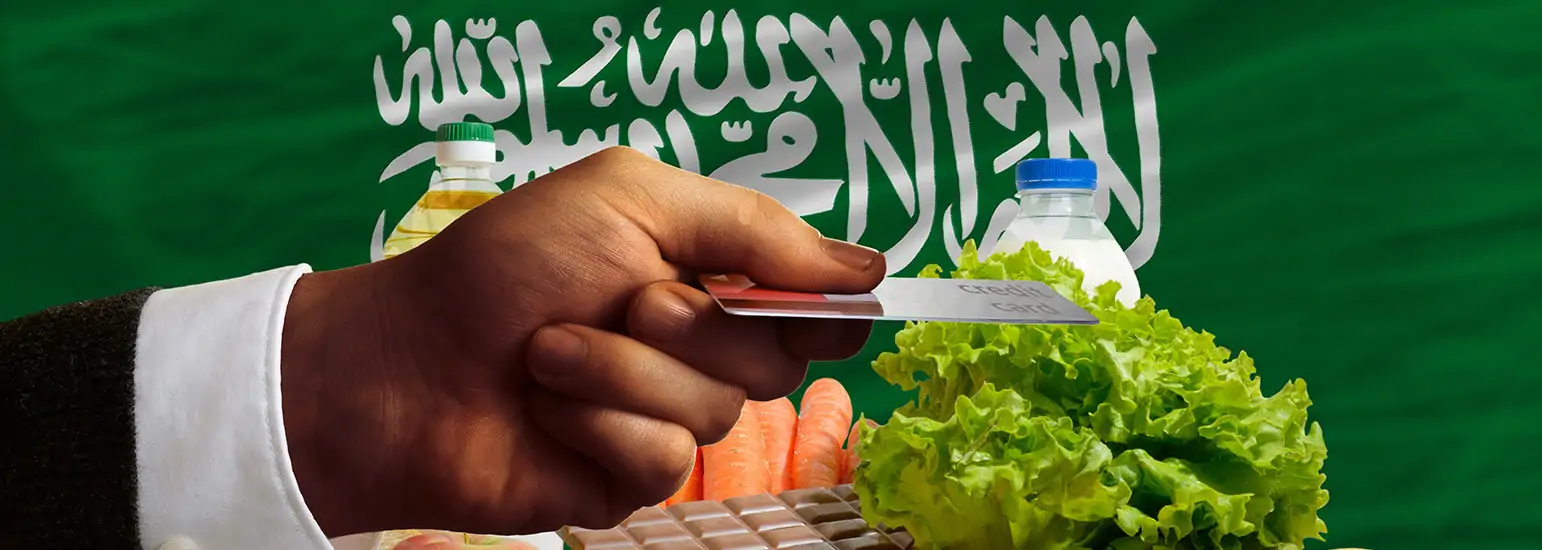Inflation is rising across the globe mainly due to rising food and energy costs, the Russia-Ukraine war, and lingering supply issues relating to the Covid-19 pandemic. Rising food prices have caused particular concern to net food-importing nations. Many people in the Middle East and North African region also remember the impact of previous food and agricultural commodity price spikes in 2008-2012 which led to unrest and conflict.
Food Price Inflation rising in Saudi Arabia
Saudi Arabia’s inflation rose to 3.1% in September, driven by higher food prices, rents, and the rising cost of utilities. Food and beverage prices rose by the equivalent of 4.3% p.a. in September, while housing rents were 3.6% higher, pushing the overall increase in housing, water, electricity, gas, and other fuels to 3.2%.
In May, the price of meat, fish, fruits, vegetables, oils, and fats in Saudi Arabia were up 20.7% compared with the same time last year. However, over the last few years, food price inflation has varied within the country and averaged 2.77% from 2012 until 2022, reaching an all-time high of 14.30% in July of 2020 at the height of the Covid-19 pandemic and a record low of -3.20% in January of 2017.
Record inflation worldwide has prompted a flurry of interest rate hikes by central banks, increasing the risk of a global recession. Inflation in the GCC countries including Saudi Arabia has been more contained, thanks to government mitigation measures such as fuel price caps.
What is limiting food price inflation in Saudi Arabia?
The idiosyncrasies of the GCC economies have helped limit inflation overall.
Key factors are their status as energy exporters rather than importers and the abundance of migrant workers in their labour markets. There is a fixed exchange rate with the U.S. dollar in five of the six GCC countries (and a quasi-peg in the case of the sixth – Kuwait). The Saudi Riyal along with other GCC currencies have appreciated along with the US dollar significantly over the course of 2022. This will also lessen the impact of increased prices for food imports.
This is the opposite of the situation in 2021 when a depreciating dollar and Riyal led to rising food prices on the domestic market. Despite this, as net food importers, these countries are still vulnerable to rising global food prices.
Government policies and inflation
The Saudi government has learnt from the experience of the food price spikes of 2008 and has a range of measures in place to ensure food security as well as to help citizens with rising prices.
The government has introduced measures to support vulnerable citizens. Gulf citizens have long been accustomed to extensive social benefits from their governments. However in recent years both the UAE and Saudi Arabia, the gulf’s two largest economies, have been trying to reduce their citizen’s reliance on the state.
Despite this, in July 2022 Saudi Arabia’s King Salman announced a $5.33 billion allocation for direct cash transfers and the stockpiling of key commodities to help citizens with food price inflation. This increased support to citizens is being paid for by increased oil revenues. According to Karen Young, senior fellow and director of the Program on Economics and Energy at the Middle East Institute.
“These two announcements are really more about just a recognition that the government is making a lot of money…There’s really high oil revenue. So, you have to make some sort of concession or admission that the government has more discretionary spending, and so they have to make it apparent that they are willing to spend on people that need it.”
The government is also committing to increasing self-sufficiency in food and investment in new farming technology is being encouraged. Food and agriculture is a key component of the government’s ‘Vision 2030’ strategy. The Strategy for Sustainable Development of Agriculture, a component of Vision 2030 has four main targets:
- Efficient and sustainable use of agricultural and natural resources especially water
- Comprehensive and sustainable food security
- Improvement in agricultural efficiency and productivity
- Sustainable rural development
This support is leading to a wide range of opportunities within the country for investment in the Agri-food sector. In September, the government announced a support package worth SR91 billion to invest in domestic food production and export capacity.
Finally, while the prices of food were already high in the Gulf they do not makeup as big a proportion of family budgets when compared with the rest of the region. Thus, the impact of food price inflation is more muted than elsewhere in the Middle East and North Africa.
What are the predictions for future inflation in Saudi Arabia?
Analysts Trading Economics forecast that food price inflation in Saudi Arabia will be 4.50% by the end of this quarter. In the long term, Saudi Arabian food price inflation is forecast to trend around 2.00% in 2023 and 3.00% in 2024.
Thus, food price inflation is expected to remain under control in Saudi Arabia, due to its unique position as an energy exporter, its peg to the US dollar, and a range of domestic policies to support vulnerable citizens and domestic food production.
Get reliable insights and advice from agribusiness consultants
If you are involved in food and agriculture, making decisions can be complex. Farrelly Mitchell can help you to make informed decisions by leveraging our expert commercial and technical insights. We support our clients across key areas such as due diligence, policy and regulation, strategy and execution and market intelligence.
Working across the food system in many locations around the world, we have an in-depth understanding of all the constantly evolving facets of the food and agricultural industry.
If you would like to help to uncover the nuances around your target investments and projects, talk to our team today.














